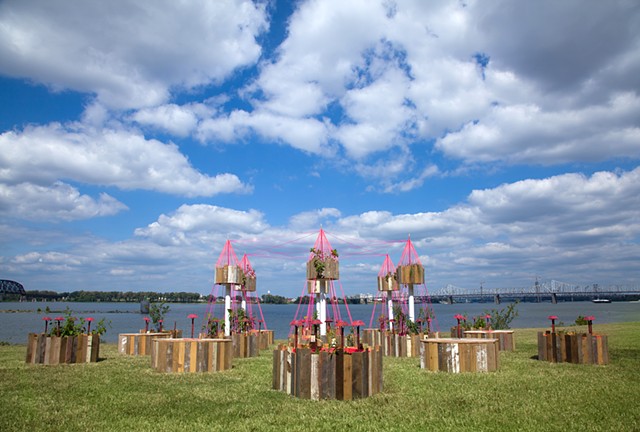Field of Vision: A Garden for Others
Field of Vision transforms the concept of a butterfly garden into an experience of wonder by offering a glimpse into the somatic perception of butterflies—creatures familiar and beautiful, yet strange and otherworldly.
Filled with high-nectar-yielding native Kentucky wildflowers, the garden provides critical urban food sources and habitat—especially for monarchs. Though also beautiful to the human eye, the garden is tailored to appeal especially to to the senses of pollinators, whose extraordinary ultraviolet-sensitive vision allows them to see ‘secret’ markings on flowers—in colors humans can only imagine.
Visitors are invited to envision how pollinators observe the garden during the day—and to return at night for an even more magical experience. After the sun sets, a mysterious glow entices visitors from afar, inviting nighttime adventures. This magical effect, created with solar-powered UV lights and fluorescing elements at the garden site, can be investigated by visitors in greater depth by checking out Adventure Kits containing high-powered UV flashlights, special light-filtering glasses & UV markers at sites like the nearby science and art museums. Guests are even invited to leave a secret message for pollinators or other visitors by tagging the project with this “invisible” ink.
The garden and Adventure Kit host sites also gift visitors with an gorgeous take-home artwork on 100% post-consumer paper: a fold out fluorescing print of local wildflowers, on which a hidden butterfly appears only under UV light. The art print features a cut-off postcard, developed with environmental non-profit NRDC, which participants are asked to mail in to the Environmental Protection Agency—asking for herbicide regulation to protect pollinators like imperiled monarchs—and human health.
By creating an imaginative experience of “butterfly vision,” Field of Vision fosters empathetic connections with these beautiful ‘others,’ sparks conversations about conservation, inspires citizen scientists, and brings a deeper attentiveness to our native ecosystems.
